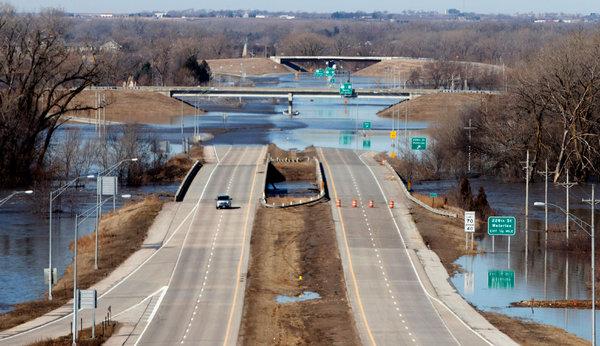

Por: Brad Hoefs
Natural disasters are a fact of life. We know they happen, and we know that they can be quite severe, and can have a long-term effect on those who are affected by the disaster. We hear of people enduring floods, tornadoes, and hurricanes, and we see the devastation on our television screens. However, when it happens to us, a natural disaster takes on a whole new meaning.
Recently here in the Midwest we’ve experienced catastrophic flooding. The flooding was quite severe just a mile from my own home in West Omaha. The damage is so extensive that nearly everyone was directly impacted, or knows someone who was. They say it’s the 500 Year Flood, and lives have been interrupted in major ways. Families are displaced. Some are being told that they can’t rebuild their homes. Some farmers have lost not only the top soil, which is so important in farming, but they’ve also lost scores of livestock. And not just to drowning, but totally lost. Herds of pigs washed away by raging floodwaters. One young man shared with me that his family has a farm, and they are devastated by the loss of a large herd of horses. To make matters worse, the water is still there so they can’t even get in to start the process of cleanup.
I think most people understand and anticipate that mental health issues are more prevalent, and the needs rise, after a natural disaster. Any life-interrupting event like that easily triggers anxiety or depression from the ongoing stress, as well as PTSD. Research shows that mental health issues can increase by at least 100% following a natural disaster. That’s incredible when you think about the fact that prior to a disaster, normal statistics tell us that about 25% of the American population has a mental health challenge in any given year. So if that number increases by 100%, this means 50% of the people experiencing a natural disaster are suffering in some way from some kind of mental health challenge.
Of course, that’s not too shocking, is it? If you’ve lost your home or your living, or you’ve been told that you can’t go back to your home, you can’t rebuild, or you don’t have insurance, you’re surely going to have long-term stressors. And that long-term stress affects your brain chemistry. My concern is that here in the Midwest we have a lot of farming communities that have been affected.
I grew up on a farm, so I know the farming mindset. All I have to do is think about my dad, and I can imagine how the farmers are going about this. They’re tough. They’re the kind of people who pull up their boot straps, get up, and take care of it. They start rebuilding. They’ve got work to do, and they keep their mind on that. But when you do that, it’s really easy to stuff down emotions and feelings. And while I have full respect for the farmers, I also have a deep concern that they will not recognize the fact that the ongoing stress and strain of what they’re going through will easily take a toll on their brain chemistry. My hope is that farmers will not just try to ‘suck it up’, but will get the help they need to work through their feelings and emotions, not only for themselves, but also for the sake of their families.
As we interact with those who have experienced and are experiencing the stress following a natural disaster, I’d like to suggest that we all learn three short, yet very important questions. They’re really very simple questions, but they help people start processing. And processing the pain, talking about the pain, the difficulties, and the trauma, is the single-most important factor in healing.
The first question is, “Tell me what happened.” Then listen intently. Don’t tell them not to feel this, or don’t worry about that, or pump them full of what I call toxic positivity. Sometimes we Christians do that. We don’t allow people to experience their pain or feel their emotions, or share them. We just start heaping on good Bible passages about how God’s gonna take this and make it work for their good. And while those Bible passages may be true, it’s premature, and people have feelings that have to get out. They have to be able to tell their story. To know that they’ve been heard, and that they’re being respected. So the first question is quite simple, yet very important to start the emotional recovery process. When you meet someone whose life has been greatly interrupted by a natural disaster, start with, “Tell me what happened.”
It’s important. It gets them talking about the trauma of what they’ve gone through. The more they tell that story, the less power that trauma has over them, and the less that trauma has the ability of hurting them in the future from stuffed-down emotions. Feelings and emotions have to be dealt with, and trauma and pain have to be processed. If you have unprocessed pain, unprocessed emotions, and unprocessed feelings, sooner or later they surface. They can show up in all kinds of peculiar ways, and other times they show up as anger. And sometimes they quietly take lives either by suicide, by the body breaking down, heart attacks, or anxiety attacks.
The second question is, “What was the worst part?” Again, this allows them to express their pain and difficulties, and to begin to rethink and understand their life story. They didn’t expect this to happen, and it has become a total interruption in their lives.
The third question helps them look inward: “Tell me how you’re doing. How are you feeling these days?” Again, getting them to express, to talk about, to normalize what they’ve been through helps greatly. What I know about the farming community is that probably nobody would go to a support group following a disaster. Especially in a small rural area, the attitude is that ‘you gotta be made of sterner stuff, you keep things private, and you don’t talk about them.’ Yet people are suffering. They’re going through real difficulties, as opposed to just hoping and praying that somehow it will all get better.
So, if you want to help your neighbors who’ve been through this disaster, I encourage you to ask these questions of them. Maybe you’re married to someone who’s not expressing how they feel, and they’re just kind of pulling up their boot straps and thinking they’re moving on. You can ask these questions then. Ask them in a meaningful way, in a way where you’re ready to listen and understand. You see, when people have been heard, when they’ve been understood, when they have in fact been respected so much that you take your time to listen, it helps in the healing process.
When these questions and others like this are processed early on, there’s less chance of PTSD setting in. There’s less chance of deep depression taking over. There’s less chance of anxiety patterns beginning to create a disorder for them. Simply put in layman’s terms, stress changes brain chemistry. Long-term stress really can be devastating on brain chemistry. And simply shoving the feelings down, or pretending like they’re not there, doesn’t do anything but make matters worse. Knowing that farming communities keep things private and are less likely to be open about their problems, asking these three simple questions may be the most effective way to go about helping these people.
So I ask you, has your life been interrupted by a natural disaster? Are you a victim of the flooding? Are you busy cleaning up, or is your community busy cleaning up? Hamburg, Iowa is completely under water. The community is going through this tragedy and traumatic event, yet they’re already pulling together and will get things done. But the reality is that stress also plays a part in the brain chemistry. And that’s just as important to work through as it is to clean up after the flood and get life back to normal. So, neighbor helping neighbor, ask these questions.
Fresh Hope es una organización sin fines de lucro basada en la fe que permite a las personas vivir bien a pesar de su desafío de salud mental.
TU regalo proporcionará a una persona Nueva Esperanza de Dios para la vida diaria. Haz clic aquí para donar, hoy.







